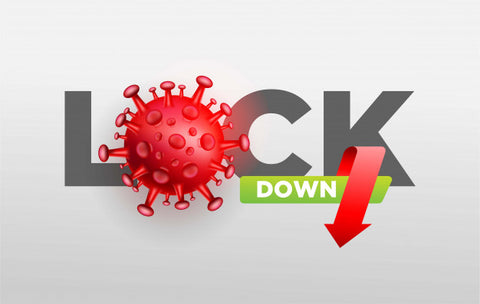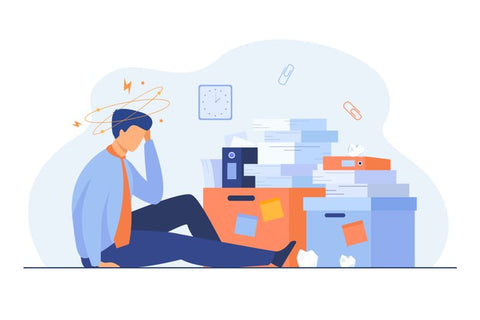Slow Down this Lockdown

The covid-19 outbreak has locked us all into the safety of our homes. People are facing difficulty adapting to the new normal. Not just it, people are bound to their homes, even people have to work from home instead of the office to keep the infection at bay.
However, this situation has a lot of mental health impacts on people. With the contraction of coronavirus 2 (sars-cov 2), people have increased stress and anxiety levels. Now, making mental health care is even more required than ever.
This blog will help you understand the mental health effects and how you could deal with them in such difficult situations.
How should we take care of ourselves during this Lockdown?

Almost more than a year of being grounded! It seems like the people are 'optimizing' to this new life. For starters, open your Instagram feed to take a glance at the perfectly sanitized lives of influencers and content creators. HASHTAG #CoupleGoals, #QuarantineOutfits, #TikTokChallenges #SelfCareRoutine, #BananaBread #PancakeSundays - wouldn't feel like the trash they're not an opportunist during this timLet'st's break this down. The most fundamental thing during this time is - your reality.
Feel like going for that passion project? Getting that summer bod? Taking therapy? not taking therapy? Crying all day? Everything is allowed. If this time is teaching us something, it's to reflect on our views about nature, the significance of our goals, and a lot of gratitude. Going through so many changes in a short period is enough stress to bag; the least one can do for themselves is take a pause—one day at a time.
#TakeCareMind

First thing first! This is happening to the entire world. It's important to know that you're not alone. It's essential to accept and be mentally prepared for a lifestyle change. Meditation resets the nervous system and makes the body calm. You're anxious; know that your body is preparing for a future threat that's normal. Try and bring your attention to the present and if you continue to experience an acute anxiety disorder, consider taking therapy for further help," says Aliya Singh (Clinical psychologist.)
#TakeCareSoul

Do what feels right; there is nothing more to this! If your soul feels like dancing, let it. If it feels like it needs rehabilitation, let it relax. Do whatever it takes to make you feel happy, alive, and positive. Cooking, sleeping, working, laying, absolutely anything. You're a priority.
#TakeCareBody

In whatever way you can* be Caring for your body doesn’t need to mean HIIT training or 10 hours of workout a week; it’s the simple act of listening to your body (It’s always right, and it’s constantly communicating). Hydrate, pump up that immunity (pro tip: traumatic stress brings down immunity, so try and reduce your stress triggers), indulge in a little healthy meal prep to last a few days, and even stock up on immunity-boosting snacks and beverages (hint: Auric).
#TakeCareSurroundings

Always remember to be grateful for being safe and around people who care. Not everyone around has a safe environment, wholesome family, shelter, or even food. If you have a dollar, there is plenty to share, remember? Take care of your elders. It’s your opportunity to give back the love you’ve received and more!
#ReduceSittingIdle

Whether for work, study, or just hours of watching movies or series, sitting too much has a negative impact on our back. Ensure to minimize the amount of time you sit by taking short walk breaks or stretch breaks of 3-5mintes every 30 minutes. Every 30 minutes, ensure to stand up and stretch or, if possible, take a short walk in the room or house. By just moving and stretching every few minutes will improve your posture and health.
#Maintain_DailyRoutine

Plan a physical activity or exercise for every day. It can either be an outdoor walk or indoor yoga, or cardio. Set up the time and do it daily for an active life. Set a particular time for being active to ensure that you get daily physical activity. Put the timing or schedule on your calendar; that will serve as a reminder to you. Make sure that you stick to your routine, as it will eventually help you build a regular habit and help in having a fit body. The physical activity being a habit will help break the lazy lifestyle and benefit mental wellbeing.
Enjoy with your #familymembers and #friends
Stay active and connected with your family and friends. Covid-19 lockdown is still there in most countries; everyone is staying at home; it is a great time to spend with your family. Have an active time with your family, such as engage in active games at home, spend time watching movies together, having dinners together, or even just relaxing all together.
Is Coronavirus Pandemic affecting your Mental Health?

The coronavirus disease is sweeping away the whole world. It has already created a considerable amount of fear, worry, and concern in people worldwide. Older adults, health professionals, and people with underlying health conditions are at high-risk factors in covid.
According to the public mental health council, a survey was done with a set of questionnaires that respondents of all age groups complete: "the major psychological impact till now is due to increased stress or anxiety level in the general population. It is one of the bad impact of covid-19 in India."
The introduction of lockdown measures, especially quarantine, has affected many people’s usual activities, chores, and livelihood. It, in a way, has increased the prevalence of mental illnesses such as loneliness, depression, alcohol, and drug addiction. People have also shown suicidal behavior, and it is expected to increase. When people's mental health is not good, and they are having depressive thoughts, then it's always better to call the helpline or seek a mental healthcare service in the first place.
The COVID-19 pandemic has disrupted critical mental health issues in 93 percent of the countries worldwide. According to a WHO(World Health Organization) survey, the demand for mental health is increasing. The study of 130 countries showcases the data that there is an increased need for mental health services and needs urgent increased funding.
A survey was conducted between June to August 2020 in 130 countries across WHO’s six regions. This survey evaluates the mental, neurological, and substance use services and how they changed in COVID-19, also how the services are disrupted and how countries and frontline workers are trying to overcome the challenges.
The countries have reported a widespread disruption of many kinds of critical mental healthcare:
-
More than 60 percent of reports showcase the disruption to mental health problems for vulnerable people. It includes 72 percent of children (due to separation from their caregivers) and young adults, 70 percent of them are older adults, and 61 percent make women requiring antenatal or postnatal services.
- Sixty-seven percent of the people saw disruptions in counseling and psychotherapy. Sixty-five percent are into critical harm reduction service, and 45 percent into opioid agonist maintenance treatment for opioid dependence.
- Over a third of people, 35 percent, reported disruption to emergency interventions, including the people who are experiencing prolonged seizures, severe substance use withdrawal syndrome, and delirium. It is a sign of a painful underlying medical condition.
- Thirty percent of the people reported disruptions to access medication for mental, neurological, and substance use disorders.
- However, three-quarters of the people reported at least partial disruptions in young people from school and workplace, making it up to 78 percent and 75 percent, respectively.
Well, more than 70 percent of the countries have adapted to telemedicine or teletherapy to overcome the in-person psychiatry services between the patient and the healthcare workers. However, there are significant disparities in the uptake of the interventions.
More than 80 percent of the high-income countries reported deploying telemedicine and teletherapy to make ends meet in physical health compared to countries with 50 percent less revenue.
WHO has already set guidelines for the countries on maintaining the essential services. It includes mental health services and recommended the countries allocate the required resources for mental health as a critical service and record their response and recovery plans. WHO has also asked the nations to monitor changes and disruptions in the services to be addressed timely.
89% of the countries reported that mental health and psychosocial support is already a part of their novel coronavirus pandemic action plan. However, only 17% of these countries have full-fledged funding for covering the required activities.

There is a need for money for mental health services. As the pandemic continues, there will be even greater demand for national and international mental health services that the countries have suffered from years of chronic underfunding.
Only 2 percent of the national health budgets are spent on mental health, and it is not enough. Even the fundraisers need to do more: because mental health still receives less than 1 percent of international aid earmarked for health.
Pre-COVID-19 estimate reveals that the US $1 trillion in economic productivity is lost annually for depression and anxiety services. Supporting this, every dollar spent on evidence-based care for psychological distress and anxiety returns to the US $5.
Some Healthy Ways to Cope with Stress
Covid 19 has affected our lives majorly and changed our lives completely. A lot of adults and children are facing challenging situations with stress and unspoken solid emotions. A few public health actions such as social distancing, wearing masks, and avoiding gatherings became necessary to reduce COVID-19. But, social isolation and loneliness have significantly increased stress and anxiety level. Learning to cope with your stress will make you and the people around you more resilient.
The following things can be caused by stress:
- Having feelings such as fear, anger, worry, numbness, and sadness.
- There can be a change in appetite, energy, and interests.
- Facing difficulty in concentrating and decision making.
- Difficulty sleeping or having nightmares.
- Physical reactions such as body pains, headaches, skin rashes, and stomach aches.
- Chronic health problems and mental health conditions can worsen.
- There can be increased use of tobacco, alcohol, and even drugs.
It is okay to feel stress, sadness, anxiety, and worry when locked up at home and maintain distance from people. Mentioned below are the ways that will help to manage stress perfectly -
-
Take a break from watching series, reading books, listening to new stories, and engaging on social media platforms. It’s good to gain information, but too much of anything can be addictive, and also, these days, there is a lot of information about pandemics that can be upsetting. Know limited news for some days and disconnect from phone, tv, and computers for a while.
- Take care of your body.
- Take deep breathes, stretch yourself every minute you get, do physical activity, or meditate.
- Eat healthy and balanced meals.
- Stop irregular snacking.
- Get plenty of sleep (mostly 7-8 hours a day).
- Avoid excess alcohol intake, tobacco, and other substance use.
- Take routine preventive measures such as vaccinations and regular mental tests as recommended by your medical provider.
- With covid-19 vaccination available, get vaccinated as soon as possible.
- Make time to unwind yourself and do other activities that you enjoy, like pursuing your hobbies.
-
Connect with your community, friends, and family. Talk with people, connect with them through video conferencing. With places with no lockdown, you can meet people while maintaining social distancing or through social media or phone, or email.
- Help others: If you have been through a stressful and anxious period, then you can help others who are going through the same. During social distancing and isolation, it is crucial to stay connected with your loved ones. You can help your family, friends, and people you know through phone calls or video calls and help them cope with their mental problems.
Stay safe, stay indoors, and we will get through this together, you know that, right?



Leave a comment